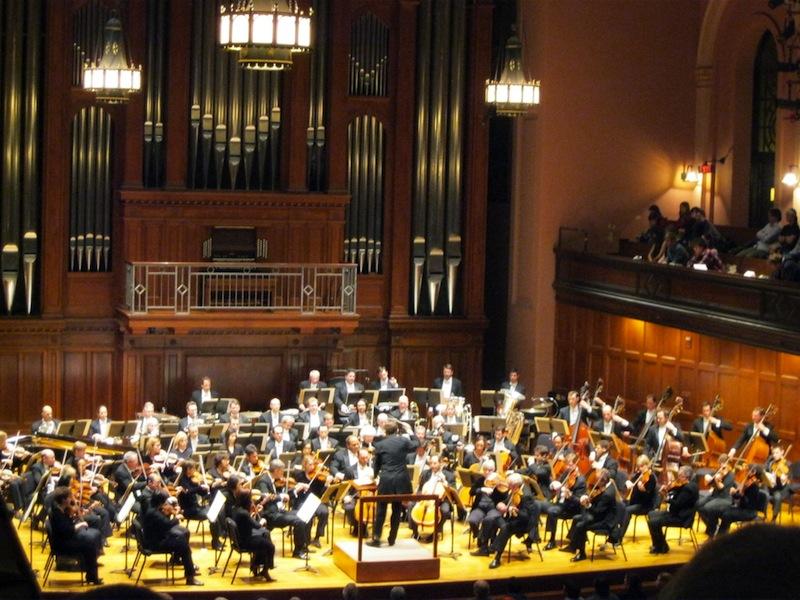Boreyko Stirs Fire in Cleveland Orchestra
The Cleveland Orchestra visited Oberlin last weekend.
March 4, 2011
As part of its annual Oberlin Artist Recital Series visit, the Cleveland Orchestra showcased new and upcoming talent during its performance last Friday evening. Although typically directed by conductor Franz Welser-Möst, last Friday’s performance showcased the artistry of Russian-born Andrey Boreyko, who led a program featuring Igor Stravinsky’s Divertimento: Suite from “The Fairy’s Kiss,” Peteris Vasks’s English Horn Concerto and Sergei Prokofiev’s Fifth Symphony in B-flat Major.
The first piece, Stravinsky’s Divertimento, was an ideal warm-up for the orchestra. Written for the ballet Le baiser de la fée (“The Fairy’s Kiss”) as an homage to Tchaikovsky’s early works, the suite beautifully conveys Stravinsky’s admiration for Tchaikovsky’s music by quoting liberally from his pieces.
The orchestra’s rendition of the suite captured the compositional style characteristic of Tchaikovsky — resplendent, lyrical and quietly evocative melodies — while still preserving Stravinsky’s primitive and rhythmical stamp, a performance that demonstrated the ensemble’s polished aesthetic. The instrumental sections impressively listened to each other and followed one another’s leads, resulting in a unification of sound that bolsters the orchestra’s reputation as a world-renowned ensemble.
However, under the direction of Andrey Boreyko, the orchestra lost its musical warmth and passion. Though metronomical, precise and assertive, Boreyko seemed somewhat musically estranged from the first two pieces, demonstrating a lack of familiarity that also revealed itself at other points throughout the recital. Although the exquisite music of Stravinsky and Prokofiev speaks for itself, under the guiding hand of Boreyko, the ensemble’s ethos appeared to be as follows: Learn the music, play it well, and forget what it actually means.
During Vasks’s English Horn Concerto, however, the audience could overlook the orchestra’s rote performance and Boreynko’s mechanical direction. Featuring the Cleveland Orchestra’s Robert Walters on English horn, the concerto showcased the virtuosic Walters’s rich tone and excellent sense of time and rhythm. Much like the work of composers Ralph Vaughn Williams and Antonin Dvorak, Vasks’s concerto incorporated folk elements and soaring, poignant melodies, serving as an ideal fit for Walters’s English horn.
During intermission, the audience anticipated Prokofiev’s Fifth Symphony, a piece that I would wait more than 15 minutes to experience. Defined by the composer himself as “a symphony about the human spirit,” Prokofiev’s Fifth Symphony exudes passion, strength, love and tragedy. I feared that these emotions would be lost in Boreyko’s translation of the piece, because even if you have learned the symphony perfectly and cleanly, if you play any of the notes without meaning, the piece communicates nothing.
Yet when Boreyko came back to the platform and conducted the first few phrases, a whole different man seemed to be onstage. The orchestra changed its demeanor as well, prompting me to mentally step back a few paces and think, “Wow.” To my surprise and delight, Boreyko knew the symphony like the back of his hand and could really lose himself in the music. It was as though he was an actor conveying every nuance of the piece, capturing Prokofiev’s spirit through his facial expressions, body language or even through oddly gesturing with his left hand.
By the end, the Cleveland Orchestra’s performance was faithful to Prokofiev’s original intentions for his symphony — it sung “the praises of the free and happy human being — of such a person’s strength, generosity and purity of soul.” During last Friday’s performance, Boreyko’s actions stirred a fire in the orchestra, and they had never sounded better.

























